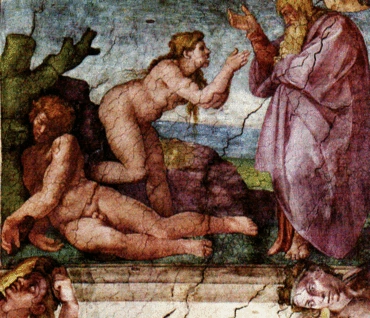Explanation of Genesis 2:22
Napsal(a) Brian David

The Lord is life itself. We are recipients of life. We give life unique forms because of our unique shapes as receptacles, and through free will we can choose how fully we will receive life. But we don't have life of our own. It follows from this that the more we turn toward the Lord and receive life, the more alive we will be; and the more we turn away the more dead we will be. It also follows that believing life is our own – with all the loves, the thoughts and the power that entails – is actually the antithesis of life.
This is the state of those in the deepest hells, who reject everything of the Lord, even His existence, and claim all life as their own. They are, in fact, only alive because the Lord forces life on them in the amount necessary to sustain existence.
This is, in a sense, what is represented by the rib – which is human, and is alive, but only in the most limited way. When the people of the Most Ancient Church (Adam) wanted to lead themselves and sense life as their own, the Lord had to use that most dead aspect of them to grant their wish. He had to use that bone, which represents our most hellish potential, what we would be if we were to reject the Lord completely.
But then the Lord did something miraculous. He turned that bone into living flesh, into a new person: the woman Eve. This represents that the Lord built that most dead, most hellish aspect of us up into something which felt life as its own, but could acknowledge that life actually came from the Lord, and could thus again be a recipient of life. It wasn't quite as pure as before; people could no longer commune directly with the Lord. But they had what they wanted instead: a sense of self.
The Writings call this – both the rib and the woman – by the Latin word proprium, essentially meaning "as of self." The rib represents the proprium on its own, which is hellish. The woman represents the proprium given life by the Lord.
(Odkazy: Arcana Coelestia 151, 152, 153, 154, 155)
Arcana Coelestia # 1712
1712. That 'he divided himself against them by night' means the shade which the apparent goods and truths were in is clear from the meaning of 'night' as a state of shade. It is called a state of shade when a person does not know whether good and truth are apparent or genuine. While a person is limited to apparent good and truth he imagines that these are genuine good and truth. It is the evil and falsity present in apparent good and truth that produce the shade and cause them to be seen as genuine. What else can people who are in ignorance know than that the good they do is their own, and that the truth they think is their own? The same applies to people who ascribe the good deeds they do to themselves and place merit in them, unaware of the fact that in this case those deeds are not good though they appear to be so, and that the proprium and the self-merit they place in them are evils and falsities that cause obscurity and darkness. And the same applies in many other instances.
[2] What evil and falsity are like, and how much evil and falsity lie concealed in such deeds, cannot possibly be seen so clearly in the life of the body as in the next life, where these are presented to view altogether as in broad daylight. But it is different if a person acts out of ignorance that has not been confirmed, for in that case those evils and falsities are easily dispersed. But if people confirm themselves in the notion that they are able to do good and to withstand evil by their own powers, and that thus they merit salvation, such a notion remains attached, and causes the good to be evil, and the truth to be falsity. Yet for all this, order requires that a person should do good as though from himself, and ought not therefore to stay his hand and think to himself, 'If I am unable to do anything good at all from myself I must wait for immediate influx' and so remain inactive. This is also contrary to order. Man ought to do good as though from himself; but when he stops to reflect on the good he is doing or has done, let him think, acknowledge, and believe that the Lord present with him has accomplished it.
[3] If by thinking as described he gives up acting as of himself he is not a subject into whom the Lord can operate. The Lord cannot flow into anyone who deprives himself of everything into which power has to be introduced. He is like someone who is not willing to learn anything except through a revelation made to him; or like someone who is not willing to teach anything unless the words are put into his mouth; or like someone who is unwilling to attempt anything unless he is directed as one without a will. But if this were done he would be more indignant still at being like an inanimate object. In fact however that which is animated by the Lord in a person is the very thing which makes it seem as though it were from himself. That man does not live from himself is an eternal truth; yet if he did not appear to do so he could not possibly live at all.






